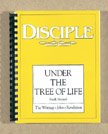 Having missed two weeks of Disciple IV (the second half of Ecclesiastes – “Enjoy” and the first half of Job “Calamity”) I am forging on with thoughts on the two books together.
Having missed two weeks of Disciple IV (the second half of Ecclesiastes – “Enjoy” and the first half of Job “Calamity”) I am forging on with thoughts on the two books together.Yale professor and all-around academic blow-hard Harold Bloom authored a book entitled Where Shall Wisdom be Found?. The two standard Biblical texts (He includes the Gnostic Gospel of Thomas) that rated his attention were Ecclesiastes and Job. He, as have many other scholarly types including the late Will Durant, claim the book of Job as an example of the finest literature ever produced. Dissected away (as hard as it is) from its religious/spiritual/superstitious significance, Job is only surpassed by the shimmering Psalms and highly troubled poetry of Ezekiel for pure poetic power in Holy Scripture. It would not be until Shakespeare that writing would see such brilliance.
Job follows Ecclesiastes in the accepted canon and does so appropriately. Ecclesiastes is an academic treatise written by a frustrated intellectual, ostensibly Solomon, who late in life realizes that all of his learning was for naught. He is just as likely to suffer, lose, or die tomorrow as the most loathsome character. Considered from the perspective of the Biblical story this evolution is quite a departure from Providence rewarding the righteous and punishing the wicked. Of course, that was never the case. The argument that Holy Scripture reflects the reaction of a people to a history of circumstances rather than a Divinely dictated history inerrant in all ways is most compelling. Over the history of the Bible from Genesis to Job, it has been necessary to refine the story, the belief of the whole.
The dense Ecclesiastes becomes beautifully illustrated in Job. Job suffered, became frustrated, then angry, and rebelled at what he felt was unfair. While fairness, like faith, is an ideal, many times it is not the point. It is well and good to argue from the point of view that “You” are right and the “Other” is wrong, but unless the “Other” gives the remotest damn, "being right" or "knowing the truth" is simply a chasing after the wind.
© Copyright, C. Michael Bailey, 2006
